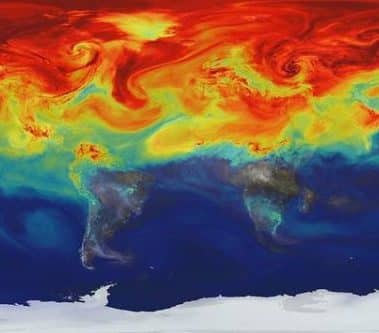Climate Change Could Cause Gulf Stream Currents to Collapse

A new study published in the journal “Nature Climate Change” indicates man-made climate alterations could be causing instability in Atlantic Ocean currents which may lead to irreversible changes to the Earth’s ecosystem.
The study, entitled “Observation-based early-warning signals for a collapse of the Atlantic Meridional Overturning Circulation,” suggests the currents have gradually weakened over the last few decades. Because of the complex nature of the currents’ circulation, it is difficult for climate scientists to pinpoint the “critical transition point” wherein they will remain permanently changed.
“The Atlantic Meridional Overturning really is one of our planet’s key circulation systems,” Niklas Boers, researcher at the Potsdam Institute for Climate Impact Research in Germany and author of the study, said in a written statement. “We already know from some computer simulations and from data from Earth’s past, so-called paleoclimate proxy records, that the AMOC can exhibit — in addition to the currently attained strong mode — an alternative, substantially weaker mode of operation. This bi-stability implies that abrupt transitions between the two circulation modes are in principle possible.”
The Gulf Stream is part of a larger current known as the Atlantic Meridional Overturning Circulation or AMOC. The AMOC operates in two intervals: warm saltwater gets transported from the tropics toward the Arctic, where cold freshwater from ice sheets and glaciers is then pushed back south along the seafloor towards the equator.
Heat energy released by CO2 emissions from human activity is disrupting the currents’ flow by reducing salinity due to increased freshwater inflow into the North Atlantic and causing thermal expansion due to overall rising global temperatures. This alteration to the natural process could decrease the strength of the AMOC, causing severe impacts on the global climate system.
Already, extreme weather events brought on by greenhouse gas emissions are becoming more common, according to a report by the United Nations Intergovernmental Panel on Climate Change published on Monday. Emissions from coal and fossil fuel burning have already led to observable alterations in weather, such as prolonged droughts and more severe flooding events worldwide.
The IPCC report published by the U.N. comprehensively combines data from more than 14,000 scientific studies. Emissions “unequivocally caused by human activities” have raised the average global temperature up 1.1°C, or roughly 34°F, from its pre-industrial average — significantly more than what would have naturally occurred without the added pollution, according to the report.
“A detailed analysis of these fingerprints in eight independent indices now suggests that the AMOC weakening during the last century is indeed likely to be associated with a loss of stability,” Boers said in a written statement. “The findings support the assessment that the AMOC decline is not just a fluctuation or a linear response to increasing temperatures but likely means the approaching of a critical threshold beyond which the circulation system could collapse.”
Because the process influences weather systems on a global scale, destabilizing the AMOC could wreak havoc worldwide by disrupting rains needed for crop irrigation in India, South America and West Africa, and raising the sea level of eastern North America. Additionally, the AMOC is known to influence weather and temperature patterns across the European continent.
Further, decreasing the AMOC’s strength amplifies the potential of a “cascade of further transitions in other major multi-stable components” of the Earth’s ecosystem. Examples of such include intensified melting of the Antarctic ice sheet, the disrupting of tropical monsoon systems and the degradation of the Amazon rainforest.
“I wouldn’t have expected that the excessive amounts of freshwater added in the course of the last century would already produce such a response in the overturning circulation,” Boers said in a written statement. “We urgently need to reconcile our models with the presented observational evidence to assess how far from or how close to its critical threshold the AMOC really is.”
























